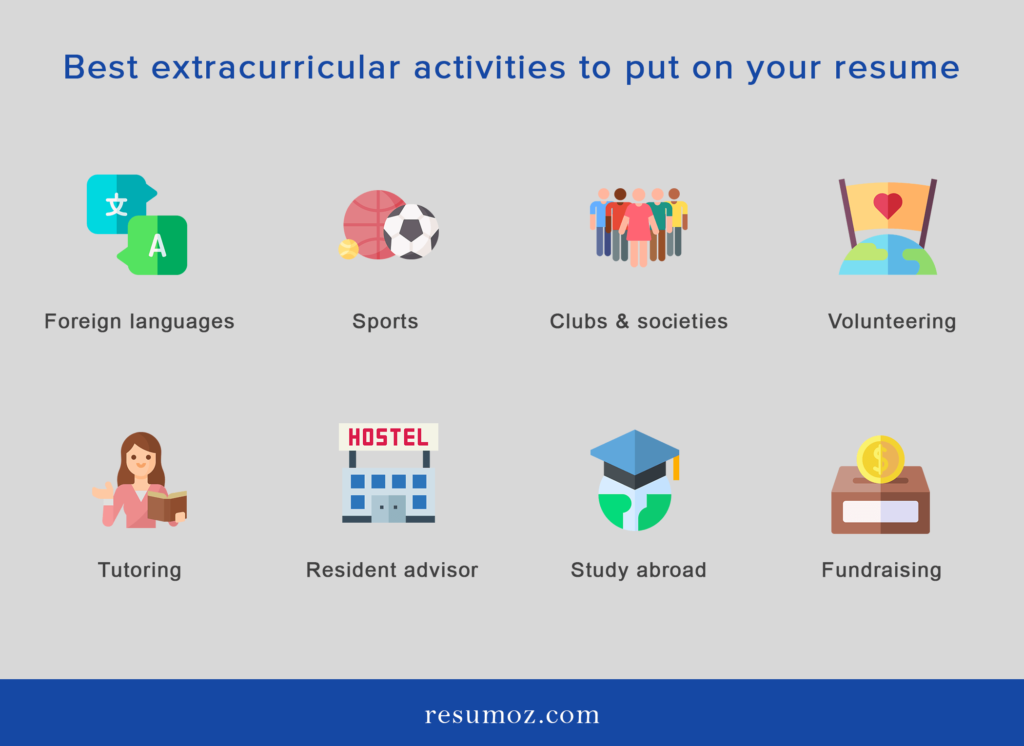Have you ever wondered if your extracurricular activities from high school or university will help you land a job?
Nobody does extracurricular activities with the intention of getting a job in the future. But undoubtedly one day they will be helpful in getting you a job even if you are short on related work experience.
This is because extracurricular activities contribute to building the skills and personal development. And also adding extracurricular activities on your resume is a great way to show your future employers what you are passionate about.
Here is all you need to know about extracurricular activities, as well as a step-by-step guide to listing them on resumes. Let’s get started!
What is an extracurricular activity?
Anything you do outside of the classroom is considered extracurricular activity. Sports, music, community service activities, jobs/internships, clubs, and other activities are examples of these. Extracurricular activities allow employers to learn more about you as a person: what are your interests, what is your level of commitment etc.
Importance of adding extracurriculars on a resume
Having extracurriculars on your resume helps you present a strong application that allows hiring managers to gain a better understanding of you. This can make or break their decision on whether or not to accept you into their organization.
When you apply for a job, hundreds of people with similar educational qualifications as you have may also apply for the same position. In such a case, your previous extracurricular activities will greatly assist you in making your job application stand out.
If you’re looking for an internship, or an entry-level job make sure you enter some relevant extracurriculars on your resume. In addition to grades, test scores, and academic achievements, extracurricular activities are used by recruiters to find applicants who stand out from the crowd, and you certainly want to do that!
Best extracurricular activities on a resume
1.
Foreign Languages
2.
Sports
3.
Clubs / Organizations / Societies
4.
Volunteering
5.
Tutoring
6.
Studying Abroad
7.
Fundraising
8.
Resident Advisor

01. Foreign Languages
The knowledge of a single or multiple foreign languages will definitely be an asset for you in getting your next big role. If applicants have the foreign language skills that the company requires, the recruiter may be interested to hire you. However, the applicant will undoubtedly have a better chance among other applicants if he or she has additional language skills.
- Persistent and hardworking character in learning new things
- Having a good awareness of different cultures
- Engaging in self development
Foreign language extracurriculars on your resume shows that you are
02. Sports
When a person engages in a sport activity, he or she learns teamwork, hard work, dedication, communication, patience, and so on. These are the qualities that most employers are looking for when they are hiring candidates.
And if you’re a great team player on the field, you might also be a great team player at work. Therefore, those who participated in sports during their college or university time, have a better chance of landing a job.
- Leadership skills
- Teamwork
- Communication
- Punctuality
- Decision making
Skills that you develop when you engage in sports
03. Clubs / Organizations / Societies
Joining a student organization, society, or club provides numerous opportunities to learn more about yourself, your goals, and your strengths. It also helps you in developing your people skills, also known as “soft skills” which are inevitably important to get a job.
There can be a lot of people working in a company. And each of them are different. But if you’ve been to extracurricular activities in societies and clubs, you know how to engage with diverse groups of people.
Being an active member of your college’s clubs and societies is a lot of fun and rewarding for you. So, if the company is looking for people who are fun, you might be one of them.
- Teamwork skills
- Time management skills
- Organization skills
- Creativity skills
If you are a member of a club or a society you have
04. Volunteering
If you have volunteered at least once in your life, mention that volunteer experience in your resume. Volunteering shows your employers that you are willing to contribute your time to others and your eagerness to help others.
Plus volunteering often helps build many of the skills that should be included in your resume and can even be used to fill in your work experience section if you are lacking them.
- Leadership
- Communication
- Planning
- Time management
- Mentoring
- Patience
- Compassion
- Customer service skills
Volunteering gives you the opportunity to learn these skills
05. Tutoring
Some schools have programs that allow students to teach or mentor their peers or younger students. This opportunity is usually given to students who excel in a particular subject or class. So if you have had such tutoring opportunities in college, be sure to mention it in the Extra Curricular Activities section of your resume. However, don’t forget to list exactly the subject (s) you taught.
If you are applying for a teaching or academic position, adding this extracurricular activity into your resume will be very effective for you.
- Communication skills
- Presentation skills
- Problem solving
Other skills that will develop when you do tutoring
06. Studying abroad
Studying abroad is an excellent way to demonstrate to a potential employer that you have multicultural experience and can work well with people from diverse backgrounds. So, why not highlight your study abroad experience on your resume?
- Cultural awareness
- Foreign language
- Thinking outside the box
- Stress management
- Adaptability
- Problem solving
- Independence
- Work under minimum supervision
Job skills that can develop when studying abroad
07. Fundraising
Fundraising is not that much easy as it sounds. This may be your sole responsibility in an organization, club, or a society. So this is a bit of a responsible job. However, by engaging in such activities you can develop many skills to do a job. Therefore, hiring managers pay special attention to applicants with fundraising experience.
- Business skills
- Marketing skills
- Reporting
- Analytical / strategic thinking
- Project management
Fundraising experience can develop below skills
08. Resident Advisor
Resident advisors are college-aged mentors who have been trained to provide a supportive and safe environment for students living in dorms, hostels, or other types of student housing. They are also referred to as college resident assistants.
Being an RA is a somewhat responsible job, and most hiring managers are aware of this. As a result, hiring managers are aware that such candidates are capable of adapting to and dealing with difficult situations.
Not everyone is qualified to be a resident advisor. If a person wishes to become an RA, he or she must demonstrate leadership potential. Working as a RA can look great on a resume because it gives you valuable work experience. Holding a RA position demonstrates your ability to communicate effectively and organize yourself, both of which are valuable assets to have on your resume.
When to include extracurricular activities on your resume
Including extracurricular activities on your resume can help you market yourself as a perfect job candidate. There are some situations that listing extracurricular activities on your resume could be advantageous for you as follows.
01. When you are lacking relevant experience
Including extracurricular activities can help transform an ordinary resume that lacks professional experience into a winning resume. If you lack relevant experience, your resume may have a lot of white space.
Extracurricular activities can help fill that white space and demonstrate your professional potential. Use bulleted lists to describe the specific skills you gained from participating in each extracurricular activity if you have more space
02. When you need to demonstrate leadership skills
Leadership skills are one of the most valuable and adaptable skills a professional can have. Employers are well aware that your experience as a school student can be easily transferred to the workplace. If you have ever had the opportunity to manage a team or lead a project as a student, you will most likely be able to do the same, even within an organization.
Where to put extracurricular activities on a resume
The placement of your extracurricular activities on a resume will vary depending on the job you are applying for and the nature of the job. The following are the most common places on a resume to include extracurricular activities.
01. Resume experience section

02. Education section

03. A dedicated resume section for extracurricular activities

How to include extracurricular activities in a resume properly
Regardless of the job you’re applying for, there are a few steps to follow when listing extracurricular activities on your resume. Do you want to make your resume more competitive and qualified? Then, follow these steps when writing the resume extracurricular activities section.
Step 1. Mention the organization’s name.
Mentioning the organization’s name in extracurricular activities will boost the credibility of your resume. If you have volunteered for a government agency or an international NGO, including this information in your extracurricular activities may help your resume to get noticed.
Step 2: Mention your position within the company.
Adding the position you held in an organization will provide recruiting managers with a clear picture of the applicant’s scale and other skills. Being a leader in such an organization can give you more advantages than other applicants.
Step 3: List the dates when you were a member of the organization.
Displaying the time you spent in the organization where you worked extracurriculars allows the hiring manager to get a quick sense of how recent your experience is. The dates also demonstrate how much effort and commitment you put into your extracurricular activity.
Step 4. List your main responsibilities and accomplishments in bullet points.
The responsibilities that can help you get the position and the skills or experience that you can transfer to your future job should be included as bullet points.
Tips to make your resume extracurricular section stand out
Tip 01: Choose the activities that are relevant to the position you are applying for.
Make sure that your extracurricular activities are relevant to the job you’re applying for. For example, If you’re looking for a job in a French company, your participation in extracurricular activities at the French Society in college may boost your qualifications for the job.
Tip 02: Make use of soft skills gained through extracurricular activities.
If you include extracurricular activities on your resume, emphasize the soft skills you gained from them. If you are the captain of a sports team, use bullet points to highlight the skills you have acquired, such as leadership, hard work, team management, and so on. This will boost the value of your resume.

